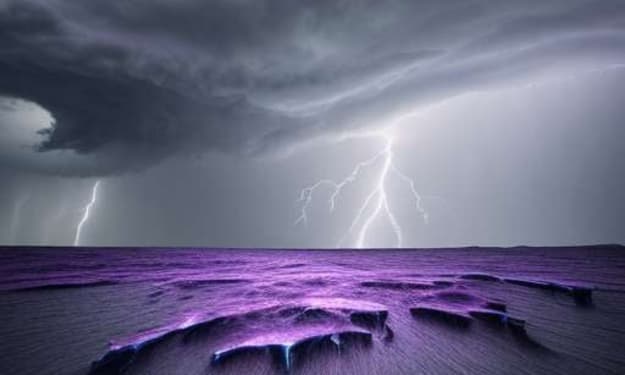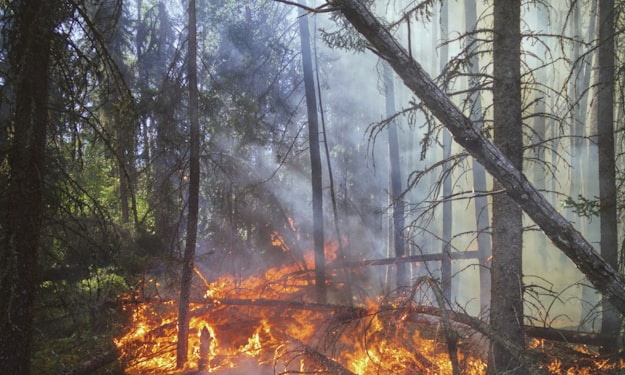Latest Stories
Most recently published stories in Earth.
Eclipse Thoughts
I. Chasing the Eclipse A six hour drive for a four minute moment? When my husband asked if I wanted to take a road trip to view the solar eclipse in totality, there was no other answer but “yes.” While I’d experienced other solar eclipses–a few in my childhood, one in my young adulthood, one just seven years ago–I’d never seen one the way others had told me they were meant to be seen.
Cheryl WrayPublished about 5 hours ago in EarthDecay and Discovery
Absolutely, let's refine and expand the story. In the heart of my city lies a world that has always held a special allure for me—a world of decay and discovery, where forgotten landscapes whisper stories of times gone by. For as long as I can remember, I've been drawn to the beauty hidden within abandonment, to the mysteries waiting to be unveiled amidst crumbling facades and overgrown paths.
Mayowa timilehinPublished about 7 hours ago in Earth

Endangered Plants and Trees
Plants Rafflesia arnoldii is the largest flower in the world and is referred to as the Corpse Flower. It got its name from the repulsive odor emitted from the flower when it blooms. This smell attracts insects which are needed to pollinate the plant.
Rasma RaistersPublished about 9 hours ago in Earth

Spotting this laser beam? Brace yourself—lightning might be lurking close by!
Lightning, with its spectacular display of power, is a natural phenomenon that never fails to captivate our imagination. When it strikes, it unleashes an incredible 300 million volts of electricity—enough to power 25 million car batteries! What's even more astonishing is that you're statistically more likely to be struck by lightning in your lifetime than to win the lottery. It's a reminder of the unpredictability of nature and the need for innovative solutions to protect against its forces.
Esha singhPublished about 12 hours ago in Earth

Discover the Enchantment of Jellyfish Air Plants: A Guide to Gardening Magic
Unveiling the Mystique of Jellyfish Air Plants Jellyfish air plants, also known as Tillandsia 'Medusa', are a mesmerizing variety of air plants that resemble the graceful movement of jellyfish in the ocean depths. With their long, trailing tendrils and delicate, wispy foliage, these plants evoke a sense of enchantment wherever they are displayed.
Gardeners TeamPublished about 12 hours ago in Earth

The Green Wonders: Examining the Beauty and Advantages of Shrubs
Forgotten heroes of the plant nation, shrubs are sometimes overshadowed by their reaching tree cousins. Landscape design, ecology, and even human health are significantly impacted by these durable and adaptable plants. In-depth discussions of the appearance, practical uses, and many different ways that shrubs improve both the environment and our lives are included in this detailed guide to the interesting world of shrubs.
david millerPublished about 12 hours ago in EarthCLIMATE CHANGE
Environmental change alludes to the drawn out adjustment of the World's environment framework, fundamentally brought about by the burning of petroleum products and other human exercises. It is quite possibly of the most squeezing worldwide test confronting this present reality, as it represents a huge danger to human wellbeing, biodiversity, and financial turn of events. Environmental change is a complicated peculiarity that influences the essential components of life on The planet, including temperature, precipitation, wind, and sea flows. This article gives an outline of environmental change, its causes and effects, and the endeavors being made to alleviate and adjust to its belongings.
Estiak NahidPublished about 15 hours ago in Earth

The region most affected by extreme weather and climate was Asia
The UN weather agency, the World Meteorological Organization, states that due to increased extreme weather and climate threats brought on by global warming, Asia was the region most affected by disasters in the world last year.
JOIN HANDS TO PROTECT THE GREEN ENVIRONMENT
"Joining Hands to Protect the Green Environment: Every Small Action Makes a Big Difference" In the modern era, environmental protection has become one of the top priorities of society. The impact of human activities on the planet is becoming increasingly severe, from air and water pollution to the decline of animal species and the threat of climate change. In this context, joining hands to protect the green environment has become a responsibility that everyone needs to undertake together.
Catholic family communityPublished about 21 hours ago in EarthEchoes of the Forest
In the heart of a vast, ancient forest, a young girl named Maya discovered a wounded wolf pup, its fur matted and eyes filled with fear. With trembling hands, she gently cradled the injured creature, feeling its rapid heartbeat against her own.


| Huge Issue To Our Earth | Changing Climate: Understanding Global Warming and the Path Forward
Introduction Imagine a world with scorching summers, rising sea levels, and extreme weather events becoming commonplace. This, unfortunately, is not a scene from science fiction but the very real consequence of global warming, a phenomenon that is rapidly altering our planet's climate.
jn smith_@#Published a day ago in Earth

Astronomical Events August 2023 | Saturn is Closer | 2 Super Moons
August 1st Super Moon August full moon or the super sturgeon moon will be visible for much of the night rising at around dusk and setting at around Dawn August 3rd close approach of the Moon and Saturn the moon and Saturn will have a close approach passing within two degrees and 15 minutes of each other on that day the moon will be 17 days old the brightness of the moon will be at a magnitude of 12 7 while Saturn will shine at a magnitude of 0.5 both of these celestial objects will be located in the constellation Aquarius August 8th close approach of the Moon and Jupiter the moon and Jupiter will have a close approach passing within two degrees and 39 minutes of each other on that day the moon will be 22 days old both of these celestial objects will be located in the constellation Aries August 9th Mercury at greatest elongation East Mercury will reach its greatest separation from the Sun and its July August 2023 evening Apparition it will be shining brightly at magnitude 0.3 this means it's far enough away from the sun and the best time to see Mercury August 9th close approach of the Moon and M45 the moon and Messier 45 will have a close approach passing within a distance of one degree and 20 minutes of each other in the night sky on that day the moon will be 23 days old use the space apps given in the video description to help you find the astronomical events August 13th perseid meteor shower the perseid meteor shower will be active from July 17th to August 24. with its peak rate of meteors occurring around August 13th during this period you have the opportunity to see perseid meteors whenever the shower's radiant point located in the constellation Perseus the number of visible meteors will increase as the radiant point gets higher in the sky at its peak the shower is expected to produce a nominal rate of around 150 meteors per hour August 16 noon Moon the Moon will pass close to the Sun and become lost in its glares for a few days it's the best time to see nebulae galaxies and clusters August 18th conjunction of the Moon and Mercury the moon and Mercury will have the same right Ascension with the moon passing Six Degrees and 56 minutes to the north of mercury on that day the moon will be two days old August 18th signed meteor shower the Signet meteor shower will be active from August 3rd to August 25 with its peak rate of meteors occurring around August 18th during this period you have the chance to see signed meteors whenever the showers radiant point located in the constellation Draco the number of visible meteors will increase as the radiant point gets higher in the sky at its peak the shower is expected to produce a nominal rate of around 3 meteors per hour August 18th close approach of the Moon and Mars the moon and Mars will have a close approach passing within one degree and 55 minutes of each other on that day the moon will be three days old both of these celestial objects will be located in the constellation Virgo August 24th lunar occultation of Antares the moon will pass in front of Antares creating a lunar occultation this occultation will be visible from the United States Mexico and Canada the lunar occultation will begin with The Disappearance of Interiors behind the moon at 6 39 PM PDT the reappearance of Antares will be visible at 7 39 PM PDT August 27 Saturn at opposition Saturn will reach opposition meaning it will be positioned opposite to the sun and the sky this event will occur while Saturn is located in the constellation Aquarius as a result Saturn will be visible for much of the night reaching its highest point in the sky around midnight local time opposition indicates that Saturn will be on the opposite side of the earth from the sun on this day Saturn will appear brighter and closer making it the best time to observe and see Saturn in the night sky August 28th Uranus enters retrograde motion Uranus will enter retrograde motion halting its usual Eastward movement through the constellations and turning to move westwards instead retrograde motion is when Earth in its faster orbit overtakes a slower moving outer planet this creates an optical illusion making the planet briefly appear to move in the opposite direction before returning to its normal path it's a result of differences in orbital speeds and distances between August 30th close approach of the Moon and Saturn on August 3 the moon and Saturn will have a close approach passing within two degrees and 16 minutes of each other at that time the moon will be 14 days old both of these celestial objects will be located in the constellation Aquarius August 30th super Blue Moon the super moon will reach full phase at this time of the month it is visible for much of the night rising at around dusk and setting at a round dog this will be the second full moon of August to o23 making it a blue moon a term used to describe any full moon which is the second to fall within a single month the super moon will be closer to the Earth than usual appearing larger and brighter in the sky than a regular full moon thanks for watching don't forget to like And subscribe for more monthly astronomical events

















